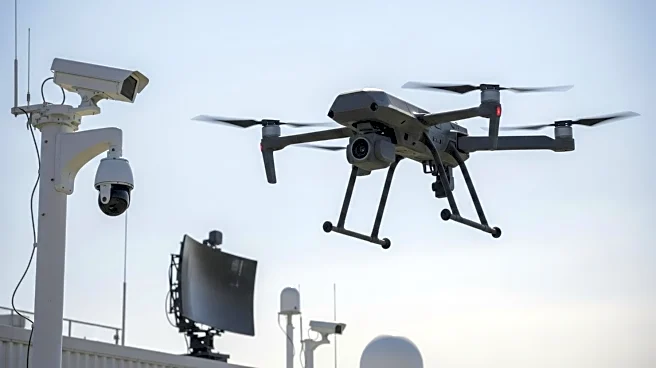What's Happening?
Unidentified drones have been spotted over Danish military sites, including the Karup military base, the country's largest. The incidents are part of a series of drone sightings that have been described as a 'hybrid attack,' with possible Russian involvement suggested by officials. The drones were observed around 8:15 PM local time, leading to a temporary closure of the Midtjylland civilian airport. Danish Prime Minister Mette Frederiksen has pointed to Russia as a potential threat to Europe's security, although Moscow has denied any involvement, labeling the incidents as a 'staged provocation.' The sightings follow Denmark's announcement to acquire long-range precision weapons.
Why It's Important?
The drone sightings underscore the growing concerns over airspace security and the use of drones in unconventional warfare. Denmark's proactive measures, including accepting Sweden's anti-drone technology, reflect the need for enhanced defense capabilities. The incidents have prompted EU defense ministers to prioritize the development of a 'drone wall' to protect against similar threats. This situation highlights the geopolitical tensions in Europe, particularly with Russia, and may influence future defense strategies and international relations within the EU.
What's Next?
Denmark is preparing for an EU summit, where anti-drone defenses will be a key focus. The country has accepted Sweden's offer of anti-drone technology to ensure the summit proceeds without disruption. Investigations into the drone sightings are ongoing, with authorities aiming to identify those responsible. The EU's emphasis on building anti-drone defenses may lead to increased collaboration and resource allocation for security measures across member states. The situation could also prompt further diplomatic efforts to address the underlying tensions and prevent escalation.
Beyond the Headlines
The incidents highlight the evolving nature of warfare, where technology plays a crucial role in security and defense strategies. The use of drones for surveillance or potential attacks raises ethical and legal questions about airspace sovereignty and the rules of engagement. As countries invest in anti-drone technologies, there may be long-term shifts in military spending and strategic priorities, influencing global defense markets and innovation in security technologies.










